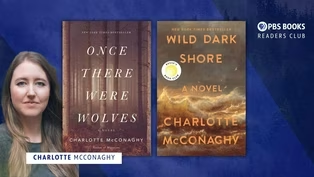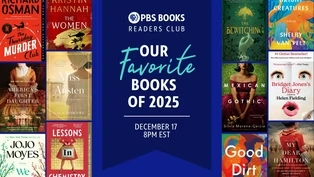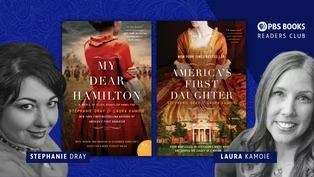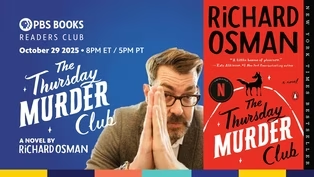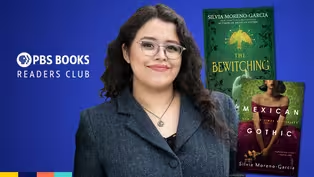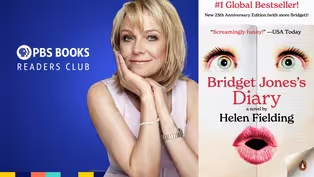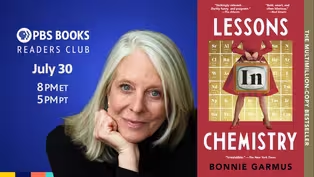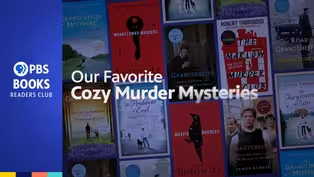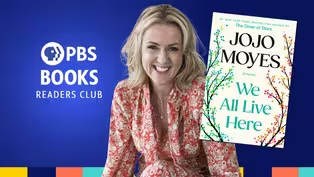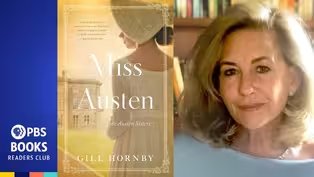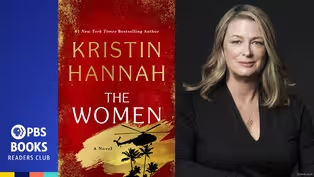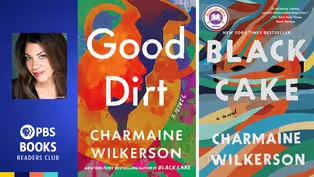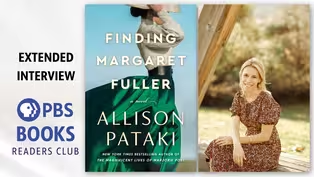
Readers Club | Allison Pataki
Season 2024 Episode 27 | 42m 1sVideo has Closed Captions
Our hosts are joined by Allison Pataki to discuss her novel "Finding Margaret Fuller".
Join the PBS Books Readers Club as we chat with New York Times bestselling author Allison Pataki about her latest book “Finding Margaret Fuller.” In this virtual discussion we’ll dive into this fascinating historical fiction read about the adventures of Margaret Fuller, a renowned writer, journalist, and trailblazing women’s rights advocate whose story has too often gone untold.
Problems playing video? | Closed Captioning Feedback
Problems playing video? | Closed Captioning Feedback

Readers Club | Allison Pataki
Season 2024 Episode 27 | 42m 1sVideo has Closed Captions
Join the PBS Books Readers Club as we chat with New York Times bestselling author Allison Pataki about her latest book “Finding Margaret Fuller.” In this virtual discussion we’ll dive into this fascinating historical fiction read about the adventures of Margaret Fuller, a renowned writer, journalist, and trailblazing women’s rights advocate whose story has too often gone untold.
Problems playing video? | Closed Captioning Feedback
How to Watch PBS Books
PBS Books is available to stream on pbs.org and the free PBS App, available on iPhone, Apple TV, Android TV, Android smartphones, Amazon Fire TV, Amazon Fire Tablet, Roku, Samsung Smart TV, and Vizio.
Providing Support for PBS.org
Learn Moreabout PBS online sponsorshipMore from This Collection
The PBS Books Readers Club is a monthly digital-first series that brings its members into conversations behind the stories of your favorite books & shows. You can watch the online on the PBS App, with extended interviews available for PBS members on PBS Passport.
Readers Club | Ep 301: Charlotte McConaghy | Once There Were Wolves
Video has Closed Captions
PBS Books Readers Club hosts author Charlotte McConaghy to discuss her novel Once There Were Wolves. (58m 55s)
Readers Club | Ep. 212: Our Favorite Books of 2025
Video has Closed Captions
PBS Books Readers Club celebrates the wrap of its second season with a highlight of 2025 (47m 55s)
Readers Club | Ep. 211: America's First Daughter | Stephanie Dray & Laura Kamoie
Video has Closed Captions
PBS Books Readers Club welcomes co-authors Stephanie Dray and Laura Kamoie (1h 1m 45s)
Wed Oct 29 2025 | Readers Club | Ep. 210: Richard Osman | Thursday Murder Club
Video has Closed Captions
PBS Books Readers Club welcomes celebrity writer Richard Osman to discuss his best-selling novel (52m 44s)
Readers Club | Ep. 209: Silvia Moreno-Garcia | The Bewitching and Mexican Gothic
Video has Closed Captions
PBS Books Readers Club welcomes award winning author Silvia Moreno-Garcia to discuss her new book. (52m 42s)
Readers Club | Ep. 208: Helen Fielding | Bridget Jones's Diary
Video has Closed Captions
PBS Books Readers Club welcomes beloved British author Helen Fielding to discuss her iconic novel (59m 30s)
Readers Club | Ep. 207: Lessons in Chemistry | Bonnie Garmus
Video has Closed Captions
PBS Books Readers Club welcomes international best-selling author Bonnie Garmus to discuss her novel (49m 3s)
Readers Club | Ep. 206: Our Favorite Cozy Murder Mysteries
Video has Closed Captions
PBS Books Readers Club hosts a special event sharing Our Favorite Cozy Murder Mysteries (52m 32s)
Readers Club | Ep. 205: We All Live Here | Jojo Moyes
Video has Closed Captions
PBS Books Readers Club welcomes international & New York Times best-selling author Jojo Moyes (57m 37s)
Readers Club | Ep. 204: Miss Austen | Gill Hornby
Video has Closed Captions
PBS Books Readers Club welcomes international best-selling author Gill Hornby to discuss her novel (51m 18s)
Readers Club | Ep. 203: The Women by Kristin Hannah
Video has Closed Captions
PBS Books Readers Club welcomes international best-selling author, Kristin Hannah to discuss novel. (53m 29s)
PBS Books Readers Club | Ep. 202: Good Dirt & Black Cake | Charmaine Wilkerson
Video has Closed Captions
PBS Books Readers Club is delighted to welcome critically acclaimed author Charmaine Wilkerson (55m 29s)
Providing Support for PBS.org
Learn Moreabout PBS online sponsorship(bright music) - With a book like "Margaret Fuller," with a character like Margaret Fuller, I have no need to veer from the history, I have no need to make stuff up.
The raw material is just that good.
I'd be crazy to not use it.
(bright music) - Well, hi and welcome to the "PBS Books Readers Club."
- Today, we'll be joined by "New York Times" bestselling author, Allison Pataki.
- We'll discuss her book, "Finding Margaret Fuller," as our feature this month, and if you haven't read it yet, don't worry, there are no spoilers.
In this conversation, we'll just enhance your reading experience.
- This is a perfect book to celebrate Women's History Month and learn more about Margaret Fuller, the amazing trailblazer whose story has gone untold for far too long.
- We will also reveal our pick for next month's read, so stick around for all of that.
Hi, I'm Fred Nahhat, here with Lauren Smith, and with Heather-Marie Montilla, our resident librarian and PBS Books National Director, and Princess Weekes, award-winning video essayist, author, with a Master's Degree in Literary Theory.
- I do what I can (everyone laughing) to contribute to this wonderful table.
(everyone laughing) - And we're happy to be here with you as well.
Please share all your thoughts in the comments, and we hope you'll join the "PBS Books Readers Club" Facebook group to find and share book recommendations, discuss your favorite reads, and really just delight in the company of other book lovers.
And please make sure to share this event.
Do that right now.
Friends do not let friends miss out on great books.
So speaking of friends, welcome back.
- We did it.
We're here again.
- What did you all think of this amazing book, "Finding Margaret Fuller"?
- I really enjoyed it.
It was kind of like "Forrest Gump" thing through, like, all these, like, big, all these, like, major men.
I would see them, I'd be like, "I know this guy.
I know this guy."
And I found myself just really thinking about these moments in time where so many great thinkers sort of organized together and just shift everything, and how those lives can be really long, or in the case of Margaret Fuller, really not as long.
- Not long enough.
- Not long enough.
- Not long enough.
- Not long enough.
- Not long enough.
I loved it.
You all know I love historical fiction.
- Huh?
What?
- I know.
But I also caught myself thinking about even her transport.
Like she was moving so many places, and how hard it was to actually get around?
And how brave she was to go to Italy, to go to England, to go to Europe at that moment, and it just, it was a great read.
I had a lot of fun.
- Yeah, a really great read.
And just to reset, if you haven't read it yet, this book is, it's about Margaret Fuller.
She's a real person, and she was sort of in with all the Transcendentalists.
So Ralph Waldo Emerson, and Henry David Thoreau, and Poe is a character in the book, which is just so interesting.
I love... - And mean.
- Yeah, so mean to Fuller, Margaret Fuller.
- Yeah.
- So all of these, Nathaniel Hawthorne, these notable writers are characters in this book, and she's interacting with them, and we know all those guys names.
I remember learning about them in ninth grade lit, but I do not remember learning about Margaret Fuller.
And it turns out she was just this amazing trailblazer.
And so this book really tells her story and her contributions, and it's a fascinating read 'cause she has all kinds of good adventures.
- It totally is.
And I will say, from the hop, it reminded me how much I love things that are written in the first person.
It's so intimate.
It's like a one woman show she's having there, the author.
The other thing is, I must say on behalf of my male cohort, is I felt a little flop sweat.
It's just a lot of...
There's just a lot of mansplaining going on, and it is among the great thinkers of the last century, and I'm thinking, you know, it doesn't matter who or when, we've just always been ridiculous.
- And I will say, if you think the dating scene is bad now, it was bad then too.
(everyone laughing) And there's just something very humbling to know even the greatest thinkers of our world can still not communicate well.
- Well, yeah, it is interesting.
And all of these, you know, these powerful men, these big thinkers, they meet Margaret Fuller, and I think that they're sort of shocked by how bright she is.
They're all sort of attracted to her, like, sexy brain.
- You're so articulate.
- And it's like, it's great.
Like I love, yeah, I love that they're interested in her mind, and that's why they really like her, but also like maybe if you would've talked to another woman before, you would've noticed that many of us are clever and have things to say.
- Yeah.
- It was also interesting, I think, the whole essence of money.
Because her father passed away, she had to be a breadwinner for her family too, and yet because she's a woman, no one thinks she deserves a wage in many cases.
And this constant tension, which although it was 200 years ago, women still...
I mean, we've come so far, but have we come far enough?
- I would say no.
- Well, say nothing of the idea that she didn't even get paid for her first two jobs.
I mean, the first two things she was doing... - Infuriating.
- Ah, yeah, I could see.
- Yes.
- Alright, well, listen, (everyone laughing) I gotta get outta this.
There's plenty to discuss with Allison Pataki, she'll be joining us in just a moment, but we wanna invite you to join the "PBS Books Readers Club" too.
- There are lots of ways to connect, including our e-newsletter.
It's the best way to join the "PBS Books Readers Club."
You'll get all kinds of insider information, exclusive author interviews, and more.
Visit pbsbooks.org/subscribe.
And be sure to follow PBS Books on Facebook and Instagram too.
We post lots of amazing and bookish content, so it's a good one to brighten up your feed.
- And if you find yourself really appreciating this program, I hope you will take a moment to show your support.
PBS stations rely on donations from folks like you and me and all of us.
And if you'd like to see more of the "PBS Books Readers Club," well here's a great way to help keep it going.
- Well, if you're watching on Facebook or YouTube, just click that link in the comments or the description or visit pbsbooks.org/donate.
You'll be taken to your local PBS station's giving webpage.
There, you can look for and find some PBS Books swag as our thanks for supporting this program.
One of those gifts is an ebook download of "Finding Margaret Fuller" or any of our PBS books features for your phone, tablet, or e-reader.
After you make your donation, you'll receive an email with a link and a special code to download one of our featured books.
Plus, we'll send you a set of the official "PBS Books Readers Club" stickers.
- [Fred] Oh, those stickers are really fun way to show off your love of reading and your support for PBS.
They're heavy-duty, removable stickers that you can put on your phone, laptop, water bottle, car, whatever you like.
Just click the link in the description or visit pbsbooks.org/donate.
- [Lauren] Donations support your local PBS station and they let us know that you'd like to see more of the "PBS Books Readers Club."
Plus, as a PBS member, you'll also enjoy access to PBS Passport, the members-only section on the PBS app where you can stream full seasons of your favorite PBS shows, including historical fiction dramas like "Call The Midwife," "Miss Scarlet and the Duke," and many more.
- It is now time to bring in our featured author.
She's the "New York Times" bestselling author of "The Magnificent Lives of Marjorie Post" and of course, today's feature, "Finding Margaret Fuller."
Allison Pataki, welcome to the "PBS Books Readers Club."
- Thank you so much for having me.
I am thrilled to be here.
And happy March Women's History Month.
- Yes, happy Women's History Month.
This was the perfect book pick for Women's History Month, so we're so happy to feature it.
- So agreed.
So we wanted to start with a question about what inspired you to write this book and why now?
- Absolutely.
So I write historical fiction, "Finding Margaret Fuller" is my 10th book, and what I love doing is digging into the stories of women who have been footnoted or sidelined through history.
Perhaps we know about their eras, we know about their time, but maybe we know the perspectives of the men who were there, and not as much the names or the legacies or impact of the women who were there.
So I was reading this biography, three years ago, called "American Bloomsbury," about this genius cluster that was in Concord, Massachusetts during the 19th century.
And I guarantee we know a lot of the names who were treated in this biography.
There was Ralph Waldo Emerson, Nathaniel Hawthorne, Louisa May Alcott, Henry David Thoreau, but there was one woman, one character, who leapt off the page for me, Margaret Fuller.
And as I read about her life, as I read about this group of great minds and thinkers who gave us so much of the canon of American literature and culture in the 19th century, I thought, I know about all of these people, but I don't know anything about Margaret Fuller, and to me, she was the most interesting character of them all.
She was who Ralph Waldo Emerson referred to as the radiant genius and fiery heart at the center of this cluster of great characters.
And so I thought, man, the story behind the story here is so good, it is so untold, and I knew that was the story I had to tell was this larger-than-life epic saga of Margaret Fuller.
- Well, not only that, but the Much that always wants More, the best read, the first to, fill in the blank, do you think it was that sidelining you talked about that describes Margaret in a way that maybe she was just never satisfied with how she was moving forward or being accepted?
- Absolutely.
I love that you pulled that out.
The Much that always wanted More was one of the many nicknames that Margaret Fuller got early in life.
She was really this... She never saw a boundary or a barrier, and there were quite a few for women in her age, that she didn't strive to push against and then push through.
Edgar Allan Poe, we can say her frenemy, a rival.
(everyone laughing) There are three categories of humanity.
There are men, women, and there's Margaret Fuller.
She just defied labels and boundaries, and she just kind of was a unique mind and entity under her own.
But as you said, she was the first to, and you can fill in the blank over and over again.
First woman to study at Harvard, first female full-time foreign war correspondent, considered by many to be the founding mother of the American Women's Rights Movement.
So she did huge things, but she was a woman living in a time that was, by and large, a man's world.
And so, in some ways, she was almost like a century ahead of her time.
But thank goodness for us and for humanity, she was when she was because she really dedicated her life's work and her brilliant mind and her prolific energy to asking the questions, raising the arguments, and moving humanity forward, not only for women, but for all people.
- Well, it was so interesting to learn about Margaret Fuller.
I also didn't know a lot about her.
But I also thought it was really fun to read about these other notable literary figures as characters in the book.
You've got Emerson, Thoreau, Hawthorne, Poe, her frenemy, as you said, Louisa May Alcott.
I'm curious how you determined their personalities and mannerisms.
Was it based on research, fully imagined?
How did you go about creating and developing those characters?
- Such a cast of colorful characters, right?
And we, obviously, we grow up reading these books by these people.
We read "Moby-Dick," we read "The Scarlet Letter" in school and after school.
But what I hadn't known and what I would venture to guess, is the case for many people, is that they were all friends.
They were all living together.
They were flirting together.
They were following... - A lot of flirting happening.
- Not so much learning.
- Or competing with one another.
They were supporting one another.
You had Thoreau living at the top of the stairs in the Emerson House.
- I had no idea about that.
I didn't know.
It was so fascinating.
- He was their hand, Thoreau was the handyman.
And then you had the Alcotts living right next door.
You had the Hawthornes living right up the street.
And so it was this fascinating moment in time and there's that, there's the human drama behind all the great books that we read.
And so for me, they each came to life with their own energy and spirits.
And the primary, there were two huge pieces in that process.
Number one were their own words.
They were prolific letter writers.
They obviously wrote great works of fiction, but they also wrote to one another.
They wrote journals, they wrote reviews.
So that was really how I was able to hear and then imagine their voices.
And then the other huge piece of it was the research of going to Concord, going into the Emerson home, seeing, this is the office where Emerson wrote, where the door right next door was Margaret's bedroom.
Hmm.
That caused some tension in the Emerson house.
This is Emerson didn't always love that fact.
And then you had the rose alcove at the top of the stairs.
You have Orchard House where Louisa May Alcott famously lived.
So going to their world, soaking up as many of the details and contextual pieces of the puzzle, and then really at a certain point in the process, once I've input enough data and the historical facts of the story, really then they sort of become their own characters.
They come to life in my imagination.
And that's when I know I'm ready to begin writing.
Once I start hearing the voices in my head.
(everyone laughing) - Like every good writer.
- That's right.
- Well, I don't think I'm giving away too much here because it happens at the very beginning of the book, chapter one, Ralph Waldo Emerson devastated to learn from Nathaniel Hawthorne that Margaret Fuller's ship has gone down.
First of all, what an open, throughout the book you allude to this, these nightmares she had about drowning.
Were these premonitions something that you documented or did you imagine them and put them into the narrative?
- That was a chilling piece of the research for me.
Margaret had a fear of water her whole life.
That is fact.
Margaret had recurring nightmares from her young childhood of drowning.
And in fact, she had several moments in her life where she had legitimate scares of water when she was traveling on the water.
And so to have her ending come in such a tragic, dramatic way, to have her life cut short in that way, they, and again, as you said, this isn't a spoiler because it's in the beginning, but Margaret's ship wrecked off the coast of New York, Fire Island, a sandbar, the people on the beach could hear their voices.
They were so close to shore.
Many on the ship made it.
It was a hurricane so the water was incredibly rough.
It is just gutting and devastating, not only the human side of it was Margaret's life and her family, but also just to think about the life cut short.
She was 40.
She had been invited to return to America to preside over the convention of the National Women's Rights Movement that would happen that fall in Worcester, Massachusetts.
we can only imagine what her voice might have done.
What an impact she might have been able to have.
And that's the tragedies we'll never know.
So stunning sequence of events and a really, really dramatic ending to a very dramatic and full, though too short, life.
- And a dramatic opening to your book.
- Absolutely.
- Yes, for sure.
- Yeah.
It's like just one of those moments in time, like the Library of Alexandria, like what if it had, you know, survived?
Emerson and Margaret's relationship throughout the book is both so engrossing and so frustrating.
- In every sense of the word.
- It's like time is a flat circle when it comes to dating.
But what made it something that you wanted to keep exploring and return to even as we spent time in the other relationships in Margaret's life?
- Absolutely.
So for many, for a moment in his time, for this really intense period of his time, Emerson saw Margaret Fuller as his muse.
And this book really begins with Margaret arriving to Concord, after the prologue, but chapter one arrives with Margaret, or begins with Margaret arriving at Mr. Emerson's doorstep to answer the invitation.
And really this is a turning point in her life because this is when Margaret finally plugs into a world and a group of colleagues and contemporaries where she has met her intellectual equals.
And when Emerson and Margaret Fuller met, it was this instant connection.
And they thought of it as a connection, kind of in every sense of the word, a mental connection.
There were obviously physical pieces to their chemistry, which I won't spoil, we'll let readers get into that, and also a meeting of their souls.
In some ways they, you know, they were Transcendentalists, they were looking for these rapturous out of body experiences.
They were very in touch with their souls and these spiritual elements of who they were.
I think, as you can see in the book, many of the men were very intrigued by Margaret.
You know, Hawthorne based Hester Prynne off of her.
And when Sophia Hawthorne, the wife of Nathaniel Hawthorne, read her husband's first completed draft of "The Scarlet Letter," she took to bed for the rest of the day with a headache because she knew the book wasn't about her.
It was about the brazen, bold woman- - I did not know that.
- You know, Margaret sparked an international scandal.
You know, the inspiration for "The Scarlet Letter," taking a lover, having a child all out of wedlock.
Margaret was this colorful, bold, brazen, kind of scandalous, kind of dangerous character as was Hester Prynne, and so I think all the men were very intrigued by her.
I think it's so fascinating talking to you and hearing you illuminate all this information.
What do you want readers to walk away with as their image of Fuller as a woman, as a feminist, as an activist, what do you want us to all see of her by reading this book?
- I would love it if readers encounter and experience this journey alongside Margaret Fuller and come away from it feeling inspired to see the way Margaret applied her brilliance and her energy into making the world a better place for so many.
The way she was an advocate, the way she spoke up and spoke out.
What I love, one of the things I love so much about historical fiction is I think it has an opportunity, and what I love as a reader of historical fiction is we can be educated as we're reading the history but also entertained.
And hopefully that creates an experience where the reader wants to comes away wanting to know more and wanting to learn more about this incredible life.
For her name to be well known, for her to take her rightful spot, center stage, as the leading lady of her own life, not just the supporting character or this footnote when we discuss the Women's Rights Movement, or when we discuss Transcendentalism or American literature, or, you know, the salons she hosted, or her studying at Harvard, the books she put out.
I would like people to know her name because I believe that everybody should know her name.
And we should know that here was a woman who was so far ahead of her time and really took the first steps that so many people could then follow and then continue to move forward, really carrying the banner that she started to carry in so many ways.
- This book, in so many ways, brings such an important story to the forefront.
If you could do a little bit of self-reflection with us and think about what characteristics you have that are like Margaret, because, obviously, even by writing these books, these historical fiction books, you are bringing, and it's Women's History Month, women to the forefront for us to be able to learn about, so... - Oh my goodness.
Oh my goodness.
Okay, that is a really humbling question because Margaret was here.
I was not reading Shakespeare at the age of five.
I was not even reading at the age of five.
I'm not even going to pretend to enter into her plane of thought.
And the other ironic thing is, she was the first woman to study at Harvard, I'm a very proud Yale alum, so I know... (Princess faintly speaking) But I would say, as a mother, as a friend, as a writer, as a human, I am grateful to Margaret and love, and would like to espouse this idea that there should not be anything that a woman looks at and thinks, "I can't do that.
That's only for the boys."
I, you know, Margaret said, there's no such thing as a women's job and a men's job, a woman's feeling and a man's feeling, 'cause that was such a convention of the time.
She said, "Let them be sea captains if that be their calling."
You know, talking about women should be able to pursue their passion because that is what they are meant to do.
I would hope that I would speak similarly, that I would make that apparent to my daughters, to my readers, to anybody with whom I come into contact.
I would hope that we could all carry forward that philosophy that you are here on this world with a particular set of gifts, passions, talents, you must pursue those.
That is sacred.
Your rights as an individual to learn, to grow, to think, to speak, Margaret would say that that is your unique, you know, purpose in life, and I would hope that my life would also testify to that fact.
- That was a great question and a great answer.
Listen, I could talk about this book all day, but I'm also curious to just learn about more about you and your process as a writer.
From the original idea to the research, do you do an outline or you just get in there and start writing?
Tell us a little bit about how your novels come to be.
- Absolutely.
So every single time, it's truly a different process.
It's a totally organic experience each time.
But what I would say is I write stories about forgotten or lesser known women from history.
And each time, I know when I've met my next woman.
I know when I've met the subject of my next book.
I tell my husband, I've been bitten, and the story woman just gets her hooks in me, and I'm obsessed, and it's a compulsion.
I'm thinking about her, I'm ravenous to know as much as I can about her, whether it's Empress Sisi, or Marjorie Post, or now Margaret Fuller.
And so the process begins with sort of this moment of how come I don't know more about this woman?
I need to learn more about this woman, and I need to write about this woman.
And from there, really then it's research.
And that's different for every book.
Depending on where the woman lived, when the woman lived, what is available.
But it's really about just ingesting as much raw material as I can.
And the history, and the dates, and the real life events, the real life individuals, that is all going to form the bones of my story.
Once I have taken in as much as I can take in, and once I've gone to the places, I've read the, you know, nonfiction sources, then it's all kind of swirling in my brain and my imagination, and the woman comes to life.
And really that's when I said, that's when I begin to hear her, that's when the historical figure sort of morphs and evolves into this imagined figure who begins to walk and talk and sort of lead me forward.
And I know that's when I'm ready to begin the writing process.
And so I've got the history as my bones, and that's when I really begin to go in and put on the flesh.
So like for an example, Margaret is staying in the Emerson home.
We know that there... We know from the history that this is true, that there's this deliciously awkward family dinner where Emerson's wife, Lidian, asks Margaret if she'll walk with her after the meal, and Margaret says, "I'm terribly sorry, but I already agreed to walk with your husband after the meal," and... (crackling drowns out speaker) You know, we know from their writings and from the history that that happened.
What I then get to do as the writer is put the reader into the scene to experience how it might have looked, what it might have felt like, and to just be the eye witness to these historical moments.
And so as someone who just loves history, and relishes this, and could eat this up, that's what I love about writing is that we then get to create these scenes, inhabit them, imagine them.
And really, with a book like Margaret Fuller, with a character like Margaret Fuller, I have no need to veer from the history.
I have no need to make stuff up.
The raw material is just that good.
I'd be crazy to not use it.
And so, so that's where, you know, I really...
I love making things up in my head and then trying to find a way to write them down in a way that will be compelling to readers.
And I, you know, 10 books in 10 years, I'm clearly a little bit obsessed, so, (faintly speaking).
- (indistinct) is it?
- That productivity, please give us your secret.
- Yeah, for sure.
- Copy.
- Coffee And like Margaret, I'm a morning person.
I'm an early riser, and honestly, I have felt like having my children has forced me to be more productive because my time is so much more squeezed.
- I can relate, I can relate to that.
- If I have my time, I've gotta sit down, and I've gotta make it count.
- All right, Allison, we love to end our "PBS Books Readers Club" conversations with a bit of a lightning round, if you are up for that?
- Absolutely.
- All right, question one, did you always know that you were a writer?
- Yes and no.
Yes, I knew I loved stories, but no, I did not realize it was through writing fiction.
- What's your ideal writing setup?
Are you a morning person, night owl?
Do you like to work in an office, a coffee shop, or do you mix it up?
- It's so good.
Morning person, 100%.
My brain is pretty worthless after 3:00 PM Eastern.
Get up, get the coffee going, while the coffee's pumping through the veins, sit down and be productive, that's my way.
I like to work at home in my office because I like to control the music, I like to control the playlist.
I like classical music where there are no lyrics, 'cause if there are lyrics, I get distracted.
I like to have easy access to tea refills, water refills, coffee.
I like to control the temperature if my feet are getting cold from sitting still too long.
- Same.
- So coffee shops, for all those reasons, don't really work for me if I'm doing the deep creative thinking.
If it's something a little lighter, then I can have that outside noise and distraction.
But usually, morning, classical music on, cup of coffee or hot tea; otherwise, quiet and in the zone.
- Perfect.
It's like we're almost twin flames, except I'm a night person.
(Allison laughing) Book e-reader or audio book?
- Hard copy all the way.
I have so much of my life on a screen or a phone or whatnot.
I don't want my books on screens.
I wanna touch them, I wanna fold them, I wanna smell them.
I love the smell of a good book.
But I also love audio books for if I'm driving or if I'm doing chores around the house, that's another great way.
But if it's a really deep, meaty, fictional experience, I wanna read it.
Audio books are more, for me, like nonfiction, something that I'm consuming almost like news, or something that I'm not gonna need to just like bask in the beauty of the language.
I wanna do that visually and tactilely.
- Yeah.
- So personally, I think that "Finding Margaret Fuller" would make an amazing movie.
I'm trying to imagine who would play Margaret Fuller.
That's, I don't know if you have ideas.
Yeah.
- I have an idea.
- Yeah.
If you at home have ideas, I wanna know what do you think, who should play Margaret Fuller in a movie?
But anyway, I think you'd have to be a pretty accomplished filmmaker to do it proper justice.
In your opinion, Allison, has there ever been a movie that was better than the book?
- Such a good question.
Okay.
I love Tolkien, and I thought that the Peter Jackson trilogy did it justice.
I won't say it's better, but it was worthy.
And that is saying a lot, I think, because I hold those books to a high regard.
And then what... Again, not better, but the "Atonement" film, which we were talking earlier.
- Yeah.
We were referencing, we think that the dress on the cover of your book, it reminds us of that beautiful dress that Keira Knightley wears in "Atonement."
That was a good movie.
♪ Keira Knightley ♪ Keira Knightley - As good.
I wouldn't say better, but I just love that book.
It was so beautiful.
But so I would say as good.
"The Notebook."
I thought that the chemistry between Rachel McAdams and Ryan Gosling so embodied this character so great.
- (faintly speaking) Ryan Gosling.
- Ryan Gosling just makes anything better.
So maybe I'll say that because... - Okay.
Okay.
- He's just 10, you know?
- I feel like 10.
(everyone laughing) - Well, I would say James Garner makes everything better too, so he was in that film.
Alright.
Favorite book, Allison, from your childhood?
- Oh.
I would say it is a tie.
Can I give a three-way tie?
- Sure.
- Sure.
- If we're going to younger, "The Velveteen Rabbit."
- Aww... - I seen that book.
I just read it again without weeping.
And then as I got a little bit older, I fell in love with "Anne of Green Gables."
- Oh!
- Yes!
- It's your favorite, right?
- That's my favorite.
- That's one of my favorites too.
- And then I have to say, because it appeals to children of all ages, and I still love it, and I'm reading it now with my kids, but I read it, you know, I've read it many, many times, the "Harry Potter" books, I would say, you know.
I didn't read them as a child per se, but they spoke to my inner child as I read them, and now I'm reading them with my children.
- I've reread those a few times too.
I was a Harry Potter nerd.
- What's the best writing advice that you've ever received?
- The best writing advice I've ever received.
Right before I hit send on my final draft for "The Traitor's Wife", my first book, I told my agent I was having a really hard time releasing it, and releasing control, and knowing that it was out of my hands and going out into the world.
And Lacy said, "Well, it's not perfect.
But guess what?
It's never going to be perfect.
There is no such thing as... You could read that a hundred more times and continue to change it.
And maybe some of those changes would be improvements and maybe some of them wouldn't.
At a certain point, we take the leap as artists and we release control.
And we release our book out into the world, and it's like a baby, it goes out and it has its own relationships and its own interactions.
And that's really a beautiful thing, but it's also a frightening thing.
And so I would just say your first draft isn't going to be perfect, your 10th draft isn't going to be perfect, but you do it.
You write, you put the pen to paper, you put in the hours, and you give it your heart and soul, because if you feel this drive inside of yourself to create, then that is sacred and that is powerful.
And that is something to be honored and acted upon."
- That's beautiful.
- Yeah.
- It is.
- It's so good.
Your favorite book that you read in the last year?
Or books.
- I'll go with two.
I really loved "Remarkably Bright Creatures" by Shelby Van Pelt because I just thought it was so original and witting and charming, and I never knew that I would love an octopus as a character so much.
But it was just such a unique book.
And I the characters because they were all so flawed and fractured, but also so compelling and so relatable.
And you just really, they really come to life for you, including the fish and the octopus.
And then the other one I really love is "Everything Happens For A Reason And Other Lies I've Loved" by Kate Bowler.
I just think living as a human in a messy world, it was a really valuable message to hear.
And just, I think her writing is very poignant and heartfelt and moving.
- So Margaret has a lot of love interest, a lot of paramours going on throughout the book.
If you had to choose yourself, personally, between Emerson, Thoreau, and Hawthorne, or we'll even throw Poe in there for a little bit of enemies to lover- - Oh my God!
(faintly speaking).
(everyone laughing) - Which gets the flower, which gets the rose?
- You don't know?
My favorite.
I always just had such a soft spot for Thoreau.
I would just go live in a cabin in the woods listening to the loons on Walden Pond.
He was so sweet.
He literally made those leather shoes for Lidian's chickens so that they wouldn't carve up the grass and the vegetable beds, as I said in the book.
He was so thoughtful and quirky and such a wild woodsman.
I think I'd go Thoreau.
- I think that's Thoreau.
That's a good choice.
Good answer, right?
- That's the right answer.
- Go Thoreau!
Go Thoreau.
(everyone laughing) - Finally, Allison, is there anything that you'd like to say to your readers?
- Thank you.
Thank you for being on this journey with me.
Thank you for being willing to read what I write so that I can continue to write.
I love and appreciate every single one of you.
I know, as a reader myself, it's no small thing to pick up a book and invest your money and your time, hours of your life.
When you give that to an author, it's an incredibly meaningful, generous thing.
And so I am just beyond grateful every single day of my life that people are willing to read my books.
And as long as you keep reading them, I'll keep writing them, so thank you.
And I also really love hearing from readers.
I love hearing from them on social media or through my website.
I love connecting.
As a reader myself, I think there's nothing cooler than connecting with an author that I love after a book that I've really enjoyed, so.
I love book clubs.
I love just hearing from people, and I hope to hear from readers with "Finding Margaret Fuller" too.
- Well, it has been a delight hearing from you, Allison Pataki.
Thanks so much for joining us.
We are grateful for the time.
- Thank you for having me.
Happy March.
- Happy March.
Oh, so good.
- Happy March.
- Well she is delightful.
- So cute.
I loved hearing everything she had to say.
You can tell that she really loved the subject, the research.
It was perfect.
- I loved hearing about her creative process, and how she really gets into the character, and how she does research and research, and then she knows, like the character speaks to her.
- Yeah - She can hear the voice.
I love that, hearing the voices.
- I have to say, from the conversation, when asked who y'all would marry, (everyone laughing) y'all said Thoreau, who was the manly man, roughly human, woodsman- - I didn't say that.
- But he was cute.
- I didn't say that.
- He was kind.
- Kind.
Who did you pick?
- I want Melville, 'cause he has a nice beard, but he's a one-liner character in this.
But I'm Team Melville.
(everyone laughing) - Okay, well, I'm sure "Finding Margaret Fuller" is at the top of your reading list, and you can pick up a copy at your local library or bookstore, download the ebook when you support your local PBS station.
- [Lauren] We're going to reveal our next "PBS Books Readers Club" pick in just a moment, so stay with us, but first, remember that as a member of your local station, you'll also get access to PBS Passport, where you can stream more amazing PBS shows that celebrate other trailblazing women.
If you loved reading "Finding Margaret Fuller", you might enjoy streaming "Fly With Me."
This is an amazing American experience story about the pioneering women who became flight attendants at a time when single women were unable to order a drink, eat alone in a restaurant, own a credit card, or get a prescription for birth control.
These women were on the front lines of the battle to assert gender equality and transform the workplace.
- Another binge worthy PBS staple featuring trailblazing women is "Call The Midwife."
A fan favorite drama based on the bestselling memoirs of the late Jennifer Worth that tells the colorful stories of midwifery and families in London's East End.
Let's take a quick look at what's happening on season 13 of "Call The Midwife."
(phone ringing) - In hospital, you deal with cases.
On the district, you're dealing with people.
(bright music) When mothers come to us, they bring everything they are with them.
- There's nothing nicer than a fresh start.
- You have done your best.
Sometimes our best must be enough.
- We are gonna take good care of you.
(baby crying) (mother laughing) - We are with you now.
- "Call The Midwife."
Stream episodes early with Passport on the PBS app.
- Full seasons of "Call The Midwife" and so many amazing shows are available to stream on Passport.
Just $5 a month makes you a member of your local PBS station, giving you access to all of the amazing shows in Passport, including the extended edition of this Allison Pataki interview.
- Yeah, we had a good long conversation with her.
Lots of extra questions that we didn't have time to squeeze in here.
So make sure that you're a Passport member so you can see the full conversation.
And don't forget your PBS stickers.
And you can get your ebook download of "Finding Margaret Fuller" or any of our featured reads.
Just click the link in the description or visit pbsbooks.org/donate.
You'll be taken right to your local PBS station's giving page.
After you complete your donation, you'll get an email from your station with a special code to download your ebook.
- Okay, so every station's donation page is just a little bit different.
So you may need to search just a little bit to find the PBS Books gifts, but stick with us because your support makes this Reader's Club possible.
- And hey, if you're not in a position to donate, you can still help by sharing this video and leaving us a comment, like, or love.
And now, friends, it is time to reveal our "PBS Books Readers Club" selection for next month.
Princess, you do the honors this month, please.
- Indeed, I shall.
So... (everyone laughing) I don't know why I'm talking like this.
The Transcendentalism is in me.
Our next pick is "The Other Valley" by Scott Alexander Howard.
This book is a page turner that imagines what seems to be an ordinary town, except that the same town exists to the east, 20 years in the future, and to the west, 20 years in the past.
So- - Ooh.
Juicy.
- [Princess] A juicy nostalgia trip, I'm sure.
- Why, and the borders between the past and the future are heavily guarded, and it raises so many interesting questions like, would you want to know your future and what would you risk in order to change it?
This program perfectly pairs with the upcoming PBS series, "Brief History of the Future," a six-part PBS documentary series about our futures and how we can reimagine them.
Hosted by renowned futurists, Ari Wallach, the show invites viewers on a journey around the world filled with discovery, hope, and possibility about where we find ourselves and what could come next.
- Very exciting.
That program premieres on PBS, April 3rd.
We're looking forward to that.
And we can't wait for author Scott Alexander Howard to join the "PBS Books Readers Club" for our next episode on April 24th.
And we have that ebook available for you to download right now.
So if you make your donation now, you can go download it as soon as you get that email from your local PBS station with that special code.
- [Heather] For now, it's time to get reading.
And be sure to submit your questions for Scott Alexander Howard by joining the "PBS Books Readers Club" Facebook group, and they could be answered on our next episode.
- [Princess] We'll also have more book recommendations in the PBS Books e-newsletter, so visit pbsbooks.org/subscribe.
- [Fred] We are so glad to have you as part of the "PBS Books Readers Club."
If you love this conversation, please consider making a donation to your local PBS station so we can keep our book club going.
Click the link in the description or visit pbsbooks.org/donate.
- Remember, you can get your removable PBS Books stickers, oh, there they are, for your laptop, phone, whatever you'd like, to show off your love for books and for PBS.
And you can also get an ebook download of one of our PBS books features.
- And everyone can help by sharing this video with all of your friends, giving us a like or a love, and subscribing to the PBS Books e-newsletter at pbsbooks.org/subscribe.
- Thanks for reading along with "PBS Books Readers Club."
- Read hard.
(everyone laughing) It's my turn.
(bright music)
Extended Readers Club | Allison Pataki
Video has Closed Captions
Clip: S2024 Ep27 | 1h 14m 25s | Watch the extended interview of "Finding Margaret Fuller" author Allison Pataki. (1h 14m 25s)
Providing Support for PBS.org
Learn Moreabout PBS online sponsorshipSupport for PBS provided by:
